Bhagavad Gita as it is a pure Holy Scripture. There are no flaws in it. The only flaws in Bhagavad Gita are the flaws in translation. It is the fault of the translators that Bhagavad Gita sometimes becomes the object of suspicion.
This articles explores and answers the following questions.
- What is wrong with Bhagavad Gita and why?
- What are the contradictions / confusions in Bhagavad Gita?
The fundamental thing that everyone needs to understand is that there are two different Gods at play in Bhagavad Gita.
- One God is Shri Krishna which is very obvious.
- The other God is the hidden God called 'Kaal' or 'Brahm' which at the time of battle of Mahabharata descended from his place and possessed the body of Shri Krishna and delivered the knowledge of Bhagavad Gita. God Kaal reveals this secret in 11.32 where he claims that he has appeared during the battle.
- There is another Supreme God which Brahm talks about in Bhagavad Gita. That God is addressed as Brahman (ब्रह्मणः)
Once readers understand this concept, all the so called flaws in Bhagavad Gita automatically start to make sense. Likewise the contradictions also get dispelled.
The biggest mystery in Bhagavad Gita is about the "Viraat" form of Shri Krishna which Krishna says that no one has ever seen before and no would ever see it again. Readers get confused by this statement because Shri Krishna had shown the Virat form in the assembly of the Kauravas which many courtiers had witnessed. Still Shri Krishna says in Bhagavad Gita that this viraat form has not been seen by anyone else. The answer to this mystery lies in the fact that the viraat form (expanded form) was shown by God Kaal. It was the viraat form of Kaal God. It is true that no one had ever seen his form before, therefore the statement stands correct.
Mentioned below are a few significant verses which every gita translator have translated incorrectly.
Bhagavad Gita Chapter 4 Verse 32 - Translation Flaw in Bhagavad Gita
- The word "ब्रह्मणः" has been translated wrongly as "Veda".
- ब्रह्मणः means God (God bigger than Brahm)
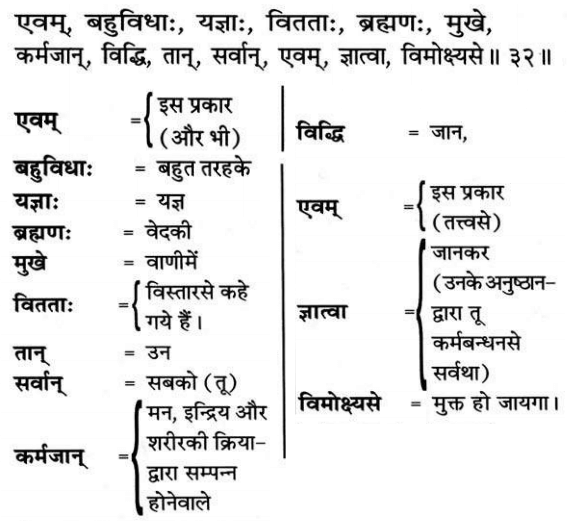
- Wrong Translation - ब्रह्मणः, मुखे = वेद की वाणी
- Correct Translation - ब्रह्मणः, मुखे = सच्चिदानन्दघन ब्रह्म की वाणी (Speech of Supreme God)
In the verse above the speaker of Gita "Brahm" is talking about another God (who is bigger than him). That bigger God has been addressed as Brahman (ब्रह्मणः). The translators of Bhagavad Gita are ignorant and cannot distinguish between the two and thus have caused a problem in translation.
This word 'ब्रह्मणः' has been correctly translated by these same ignorant authors in Bhagavad Gita Chapter 17, verse 23 as "Supreme God".
Bhagavad Gita Chapter 7 Verse 19 | Contradiction in Gita
In Bhagavad Gita Chapter 7 Verse 19 the speaker of Bhagavad Gita is saying that it is rare to find a person who worships me or who professes my worship.
This comes as a contradiction to the devotee society because they cannot comprehend this, as everyone in the Hindu faith at least is in some way or other worshipping Shri Krishna. If they are not worshipping Shri Krishna, at least they consider Shri Krishna as God. When they read this verse they get confused as to why God has said that rarely anyone worships me.
The answer is again very simple. Please first read the verse below.
Bhagavad Gita Chapter 7 Verse 19
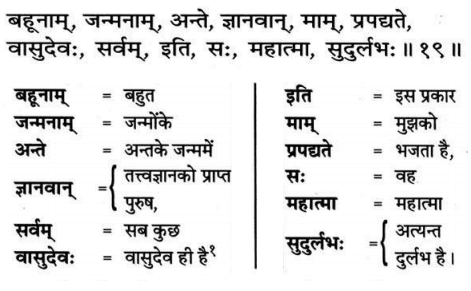
If one grasps the concept that Gita has been said by Kaal (Brahm), then it is easy to understand that no one worships Kaal. This is the case because no one knows about Kaal (Brahm). Therefore it is rare to find someone who worships Kaal. The verse however stands correct.
Bhagavad Gita Chapter 8 Verse 17 | Flaw in translation
- Wrong Translation - ब्रह्मणः = ब्रह्मा (Brahma)
- Correct Translation - ब्रह्मणः = परब्रह्म (God bigger than Brahm)
- Wrong Translation - सहस्त्रायुगपर्यन्तम् = एक हज़ार चतुर्युग की अवधि वाला (Chaturyug)
- Correct Translation - सहस्त्रायुगपर्यन्तम् = एक हज़ार युग की अवधि वाला (yug)
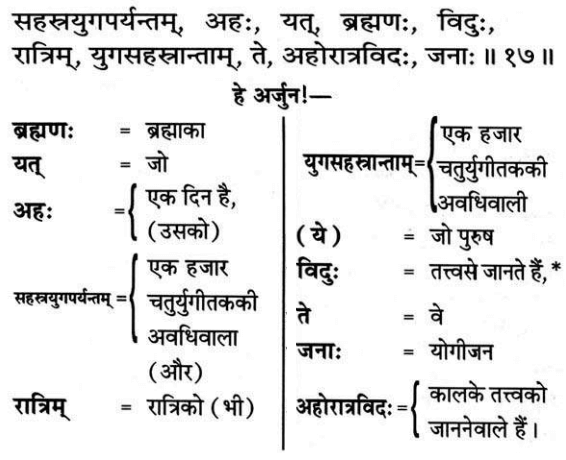
- Every translator has translated the word "Yug" as Chaturyug which is incorrect.
- Likewise they have also translated the word "Brahman" as Brahma which again is totally wrong.
Watch the video below.
Bhagavad Gita Chapter 11 Verse 48 & 53 | Confusion in Bhagavad Gita
In Bhagavad Gita Chapter 11 verse 48 and 53, the knowledge giver of Bhagavad Gita (Brahm) says that he cannot be seen by any means i.e. he cannot be seen.
- by worship mentioned in the vedas,
- by performing any form of penance (tapp तप)
- by doing any sort of charity
- by performing any sort of yagyas
Bhagavad Gita Chapter 11 verse 48
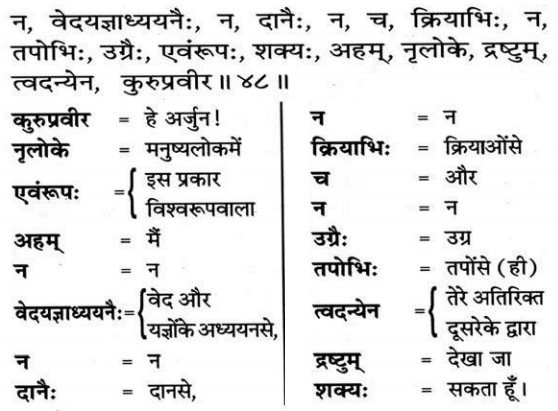
Bhagavad Gita Chapter 11 verse 53
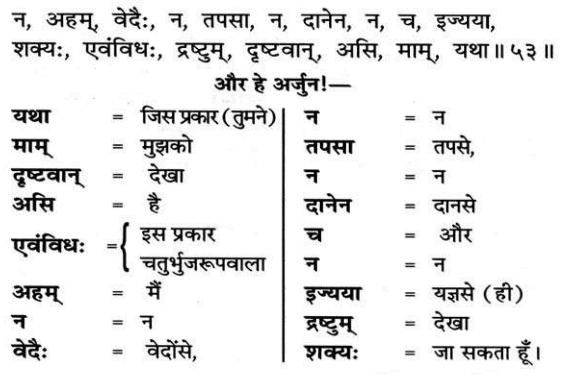
Brahm clarifies it twice in Gita chapter 11 verse 48 and 53 that he cannot be seen (in other words achieved) by any sort of worship as per vedas, by doing any penance or charity or yagya.
In verse 54 Brahm further says that my four armed form that you have seen can be seen by undivided devotion. However the fact remains that his 1000 arm form cannot be seen by any kind of worship or meritorius act or yagya etc.
This creates a confusion as to what sort of worship should one perform because any kind of worship according to the Vedas has been rendered incomplete as it cannot grant one the sight of Brahm. In other words worship as per vedas is useless and so is penance, charity and yagyas.
This is the reason Brahm (Kaal) has said that find a Tatvadarshi Saint who will give you the supreme knowledge about the Supreme God by which you can achieve supreme peace and liberation.
This proves that worship according to vedas is also incomplete.
Read the Summary of Bhagavad Gita Chapter 11
Flaw in Bhagavad Gita Chapter 18 Verse 66
The flaw in this verse is with the word 'vraj'.
- Vraj means "to go" or "go".
- Every Gita translator has translated Vraj as "come".
They have made this mistake because of their very poor understanding of the Bhagavad Gita. See verse below.
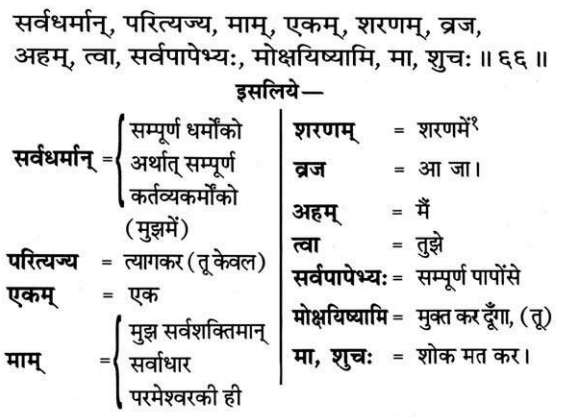
- Incorrect translation: व्रज = आ जा (come)
- Correct translation: व्रज = जा (go)
God Kaal is asking Arjun to go into the shelter of some other Supreme God. Everyone has translated Vraj as "come" which is wrong and completely opposite to what Kaal is saying in this verse.
Read Gist of Bhagavad Gita Chapter 18 and more details about correct translation of Gita Chapter 18 Verse 66.
